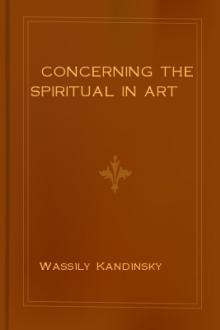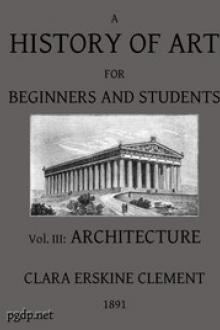Concerning the Spiritual in Art by Wassily Kandinsky (e reader manga .txt) 📕

But while they have followed Gauguin's lead in abandoningrepresentation both of these two groups of advance are lacking inspiritual meaning. Their aim becomes more and more decorative,with an undercurrent of suggestion of simplified form. Anyone whohas studied Gauguin will be aware of the intense spiritual valueof his work. The man is a preacher and a psychologist, universalby his very unorthodoxy, fundamental because he goes deeper thancivilization. In his disciples this great element is wanting.Kandinsky has supplied the need. He is not only on the track ofan art more purely spiritual than was concei
Read free book «Concerning the Spiritual in Art by Wassily Kandinsky (e reader manga .txt) 📕» - read online or download for free at americanlibrarybooks.com
- Author: Wassily Kandinsky
- Performer: -
Read book online «Concerning the Spiritual in Art by Wassily Kandinsky (e reader manga .txt) 📕». Author - Wassily Kandinsky
Complex rhythmic composition, with a strong flavour of the symphonic, is seen in numerous pictures and woodcuts of the past. One might mention the work of old German masters, of the Persians, of the Japanese, the Russian icons, broadsides, etc. [Footnote: This applies to many of Hodler’s pictures.]
In nearly all these works the symphonic composition is not very closely allied to the melodic. This means that fundamentally there is a composition founded on rest and balance. The mind thinks at once of choral compositions, of Mozart and Beethoven. All these works have the solemn and regular architecture of a Gothic cathedral; they belong to the transition period.
As examples of the new symphonic composition, in which the melodic element plays a subordinate part, and that only rarely, I have added reproductions of four of my own pictures.
They represent three different sources of inspiration:
(1) A direct impression of outward nature, expressed in purely artistic form. This I call an “Impression.”
(2) A largely unconscious, spontaneous expression of inner character, the non-material nature. This I call an “Improvisation.”
(3) An expression of a slowly formed inner feeling, which comes to utterance only after long maturing. This I call a “Composition.” In this, reason, consciousness, purpose, play an overwhelming part. But of the calculation nothing appears, only the feeling. Which kind of construction, whether conscious or unconscious, really underlies my work, the patient reader will readily understand.
Finally, I would remark that, in my opinion, we are fast approaching the time of reasoned and conscious composition, when the painter will be proud to declare his work constructive. This will be in contrast to the claim of the Impressionists that they could explain nothing, that their art came upon them by inspiration. We have before us the age of conscious creation, and this new spirit in painting is going hand in hand with the spirit of thought towards an epoch of great spiritual leaders.
*** END OF THE PROJECT GUTENBERG EBOOK CONCERNING THE SPIRITUAL IN ART ***
This file should be named cnspr10.txt or cnspr10.zip Corrected EDITIONS of our eBooks get a new NUMBER, cnspr11.txt VERSIONS based on separate sources get new LETTER, cnspr10a.txt
Produced by John Mamoun <mamounjo@umdnj.edu>, Charles Franks and the Online Distributed Proofreaders Website
Project Gutenberg eBooks are often created from several printed editions, all of which are confirmed as Public Domain in the US unless a copyright notice is included. Thus, we usually do not keep eBooks in compliance with any particular paper edition.
We are now trying to release all our eBooks one year in advance of the official release dates, leaving time for better editing. Please be encouraged to tell us about any error or corrections, even years after the official publication date.
Please note neither this listing nor its contents are final til midnight of the last day of the month of any such announcement. The official release date of all Project Gutenberg eBooks is at Midnight, Central Time, of the last day of the stated month. A preliminary version may often be posted for suggestion, comment and editing by those who wish to do so.
Most people start at our Web sites at: http://gutenberg.net or http://promo.net/pg
These Web sites include award-winning information about Project Gutenberg, including how to donate, how to help produce our new eBooks, and how to subscribe to our email newsletter (free!).
Those of you who want to download any eBook before announcement can get to them as follows, and just download by date. This is also a good way to get them instantly upon announcement, as the indexes our cataloguers produce obviously take a while after an announcement goes out in the Project Gutenberg Newsletter.
http://www.ibiblio.org/gutenberg/etext03 or ftp://ftp.ibiblio.org/pub/docs/books/gutenberg/etext03
Or /etext02, 01, 00, 99, 98, 97, 96, 95, 94, 93, 92, 92, 91 or 90
Just search by the first five letters of the filename you want, as it appears in our Newsletters.
Information about Project Gutenberg (one page)
We produce about two million dollars for each hour we work. The time it takes us, a rather conservative estimate, is fifty hours to get any eBook selected, entered, proofread, edited, copyright searched and analyzed, the copyright letters written, etc. Our projected audience is one hundred million readers. If the value per text is nominally estimated at one dollar then we produce $2 million dollars per hour in 2002 as we release over 100 new text files per month: 1240 more eBooks in 2001 for a total of 4000+ We are already on our way to trying for 2000 more eBooks in 2002 If they reach just 1-2% of the world’s population then the total will reach over half a trillion eBooks given away by year’s end.
The Goal of Project Gutenberg is to Give Away 1 Trillion eBooks! This is ten thousand titles each to one hundred million readers, which is only about 4% of the present number of computer users.
Here is the briefest record of our progress (* means estimated):
eBooks Year Month
1 1971 July 10 1991 January 100 1994 January 1000 1997 August 1500 1998 October 2000 1999 December 2500 2000 December 3000 2001 November 4000 2001 October/November 6000 2002 December* 9000 2003 November* 10000 2004 January*
The Project Gutenberg Literary Archive Foundation has been created to secure a future for Project Gutenberg into the next millennium.
We need your donations more than ever!
As of February, 2002, contributions are being solicited from people and organizations in: Alabama, Alaska, Arkansas, Connecticut, Delaware, District of Columbia, Florida, Georgia, Hawaii, Illinois, Indiana, Iowa, Kansas, Kentucky, Louisiana, Maine, Massachusetts, Michigan, Mississippi, Missouri, Montana, Nebraska, Nevada, New Hampshire, New Jersey, New Mexico, New York, North Carolina, Ohio, Oklahoma, Oregon, Pennsylvania, Rhode Island, South Carolina, South Dakota, Tennessee, Texas, Utah, Vermont, Virginia, Washington, West Virginia, Wisconsin, and Wyoming.
We have filed in all 50 states now, but these are the only ones that have responded.
As the requirements for other states are met, additions to this list will be made and fund raising will begin in the additional states. Please feel free to ask to check the status of your state.
In answer to various questions we have received on this:
We are constantly working on finishing the paperwork to legally request donations in all 50 states. If your state is not listed and you would like to know if we have added it since the list you have, just ask.
While we cannot solicit donations from people in states where we are not yet registered, we know of no prohibition against accepting donations from donors in these states who approach us with an offer to donate.
International donations are accepted, but we don’t know ANYTHING about how to make them tax-deductible, or even if they CAN be made deductible, and don’t have the staff to handle it even if there are ways.
Donations by check or money order may be sent to:
Project Gutenberg Literary Archive Foundation PMB 113 1739 University Ave. Oxford, MS 38655-4109
Contact us if you want to arrange for a wire transfer or payment method other than by check or money order.
The Project Gutenberg Literary Archive Foundation has been approved by the US Internal Revenue Service as a 501(c)(3) organization with EIN [Employee Identification Number] 64-622154. Donations are tax-deductible to the maximum extent permitted by law. As fund-raising requirements for other states are met, additions to this list will be made and fund-raising will begin in the additional states.
We need your donations more than ever!
You can get up to date donation information online at:
http://www.gutenberg.net/donation.html
***
If you can’t reach Project Gutenberg, you can always email directly to:
Michael S. Hart <hart@pobox.com>
Prof. Hart will answer or forward your message.
We would prefer to send you information by email.
**The Legal Small Print**
(Three Pages)
***START**THE SMALL PRINT!**FOR PUBLIC DOMAIN EBOOKS**START*** Why is this “Small Print!” statement here? You know: lawyers. They tell us you might sue us if there is something wrong with your copy of this eBook, even if you got it for free from someone other than us, and even if what’s wrong is not our fault. So, among other things, this “Small Print!” statement disclaims most of our liability to you. It also tells you how you may distribute copies of this eBook if you want to.
BEFORE! YOU USE OR READ THIS EBOOK By using or reading any part of this PROJECT GUTENBERG-tm eBook, you indicate that you understand, agree to and accept this “Small Print!” statement. If you do not, you can receive a refund of the money (if any) you paid for this eBook by sending a request within 30 days of receiving it to the person you got it from. If you received this eBook on a physical medium (such as a disk), you must return it with your request.
ABOUT PROJECT GUTENBERG-TM EBOOKS This PROJECT GUTENBERG-tm eBook, like most PROJECT GUTENBERG-tm eBooks, is a “public domain” work distributed by Professor Michael S. Hart through the Project Gutenberg Association (the “Project”). Among other things, this means that no one owns a United States copyright on or for this work, so the Project (and you!) can copy and distribute it in the United States without permission and without paying copyright royalties. Special rules, set forth below, apply if you wish to copy and distribute this eBook under the “PROJECT GUTENBERG” trademark.
Please do not use the “PROJECT GUTENBERG” trademark to market any commercial products without permission.
To create these eBooks, the Project expends considerable efforts to identify, transcribe and proofread public domain works. Despite these efforts, the Project’s eBooks and any medium they may be on may contain “Defects”. Among other things, Defects may take the form of incomplete, inaccurate or corrupt data, transcription errors, a copyright or other intellectual property infringement, a defective or damaged disk or other eBook medium, a computer virus, or computer codes that damage or cannot be read by your equipment.
LIMITED WARRANTY; DISCLAIMER OF DAMAGES But for the “Right of Replacement or Refund” described below, [1] Michael Hart and the Foundation (and any other party you may receive this eBook from as a PROJECT GUTENBERG-tm eBook) disclaims all liability to you for damages, costs and expenses, including legal fees, and [2] YOU HAVE NO REMEDIES FOR NEGLIGENCE OR UNDER STRICT LIABILITY, OR FOR BREACH OF WARRANTY OR CONTRACT,





Comments (0)